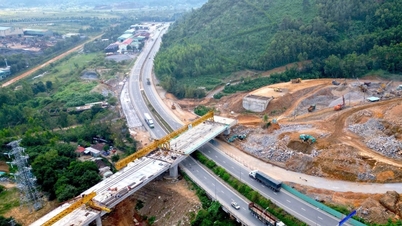This viewpoint was given by Mr. Tran Khac Tam, member of the 13th National Assembly, People's Council member, Chairman of the Soc Trang Provincial Business Association, in an interview with Dan Tri reporter right after the National Assembly passed the Resolution on mechanisms and policies for private economic development.
Joy, trust and expectation are the emotions that a business leader, business association leader like Mr. Tam in particular and the business community in general feel when witnessing the historic moment of this resolution being passed.
The National Assembly has just passed a Resolution on mechanisms and policies for private economic development with a high consensus rate. As a member of the business community, what are your feelings when witnessing the special attention of the Party and State leaders for the private economic sector with many breakthrough orientations and policies this time?
- I feel this is a real "ice-breaking" moment. For the first time in many years, the private economic sector is no longer on the sidelines in strategic decisions, but is affirmed by the Party as "the most important driving force" of the national economy.
The Politburo in Resolution 68 also requested to completely eliminate perceptions, thoughts, concepts, and prejudices about Vietnam's private economy, while correctly assessing the important role of the private economy in the country's development.
This is not only a recognition but also helps to inspire confidence and is a spiritual medicine for the business community that is struggling to overcome countless challenges.
Recently, after the Politburo issued Resolution 68 on private economic development, General Secretary To Lam also wrote an article entitled "New driving force for economic development". In it, the General Secretary particularly emphasized the role of material production activities as the foundation for building socialism. This not only has theoretical significance but also creates a clear political corridor for private enterprises to develop with confidence, self-respect and self-reliance.
Perhaps, we have never found ourselves standing so close to the strategic flow of the country.
As a business leader and Chairman of the Local Business Association, what breakthrough directions have impressed you the most in the strategy of prioritizing private economic development set forth by the Politburo, the National Assembly and the Government?
- I am particularly impressed with the fundamental and core policies, which are to fully guarantee the freedom of business, property rights and equal competition rights for private enterprises, and the right to fair access to the country's resources. These contents have actually been recognized for a long time, but in reality there are still many barriers that limit the freedom of enterprises.
Along with the policy of expanding access to essential resources such as land, capital and high-quality human resources for the private sector, breakthroughs in the direction of handling violations are both fundamental and practical changes, creating a solid legal and psychological foundation for businesses to confidently invest, expand production, innovate and integrate.
We have heard a lot about the fear of legal risks and widespread inspections of businesses. But the new resolution has resolved this fear by requiring that each business and business household not be inspected more than once a year, except in cases where there is clear evidence of violations; transferring all administrative procedures to post-inspection (except for special areas), cutting at least 30% of procedures and compliance costs.
These are very specific policies, requiring enforcement agencies to not only talk but also act, not "spreading the carpet above and scattering nails below" as has been the case for a long time.
In the long term, in my opinion, it is necessary to soon have a separate law on private economic development to fully institutionalize policies at the legal level to create a more specific, clearer, and more solid legal corridor for the development of the private economy. In particular, this law needs to establish rights to access resources, rights to property protection, rights to support innovation, and obligations of transparency and fair competition.
The Politburo's orientation in Resolution 68 and the Resolution on mechanisms and policies for private economic development recently passed by the National Assembly also clearly state the policy of handling violations in the direction of resolutely not criminalizing economic-civil relations; prioritizing the application of economic and administrative measures to remedy violations before considering criminal handling.
In cases that are on the borderline between criminal handling or not, criminal handling must be absolutely avoided. If criminal handling is required, priority must still be given to using economic measures to remedy the consequences first and the results of that remedy must be used as a basis for considering and resolving the next steps, in the direction of considering reducing criminal liability if the enterprise has actively remedied the consequences.
This is a breakthrough and important content, helping to minimize legal risks, creating a safe business environment so that enterprises can feel secure in their operations. This policy also helps Vietnam's business environment become more friendly and attractive to domestic and foreign investors.
In your opinion, is the new orientation in handling violations, which prioritizes administrative, economic, and civil measures instead of criminal measures, strong enough to help businesses feel more confident and secure in their investment, production, and business activities?
- First of all, this is an important policy, a strong commitment, creating a foundation for the private economy to have a breakthrough development. The private business community has long lived in a "legal gray area" - if you do the right thing, no one will recognize you, if you do the wrong thing, you will be prosecuted.
We do not advocate profiteering, but in reality many errors arise from policy changes, from different interpretations of the law, or from unclear provisions of the legal system.
Resolution 68 of the Politburo as well as the resolution just passed by the National Assembly stated a very progressive principle: "If the legal provisions are on the borderline of criminal handling, or non-criminal handling, then absolutely do not criminalize them."
This is an important political turning point, but to make it a reality, there must be specific institutionalization steps. Accordingly, it is necessary to amend the Penal Code in the direction of eliminating purely economic acts from the scope of criminalization, retaining only fraudulent acts with intentional, sophisticated, and repetitive elements.
I would also like to propose the issuance of a joint resolution between the prosecution agencies on guidelines for clearly distinguishing economic - civil - criminal acts; or to stipulate the principle of "prioritizing the remediation of economic consequences before criminal proceedings" as a mandatory provision in the law. In addition, it is necessary to soon apply the principles of "presumption of innocence" and "no retroactive disadvantage" in all economic disputes...
We also recommend that the Government build an early warning system for legal risks, so that businesses can proactively prevent them instead of passively "taking the hit".
Previously, enterprises were considered as an object to be managed, but with a new mindset, the Politburo identified private enterprises as partners to join the State in building and developing the country. In your opinion, how will the lack of emphasis on old-style management help private enterprises to escape from the long-standing constraints?
- The resolution recently passed by the National Assembly strongly affirms that businesses have the right to freedom of business and enjoy equality in a competitive environment.
All new mechanisms and policies are built based on the spirit of taking people and businesses as the center and subject; all policies designed must revolve around serving and creating favorable conditions for people and businesses to develop. Private businesses are also given the opportunity to participate in large projects, strategic projects, and important projects of the country.
Perhaps, this is a revolution in thinking and institutions, from resolutely eliminating the "ask - give" mechanism, abandoning the "if you can't manage it, then ban it" mindset - a safe mindset but hindering development, to reforming, innovating and removing many barriers, aiming to create a favorable environment for development, so that the economic flow can circulate naturally.
Once the "management" mindset is replaced by "support and companionship", becoming a partner to join the State in creating and developing the country, businesses will reduce the risk of uncertainty - something that has long made many businesses hesitate.
Currently, many localities and departments still consider businesses as suspicious and easy to find fault with. But with this resolution, with specific regulations such as all procedures being transferred to post-inspection; licensing agencies must be responsible if delays cause damage to businesses; linking staff responsibility to business support results... then this is a substantial change.
The National Assembly’s resolution sets out many policies on institutionalization and facilitating access to resources. In reality, in business operations, what are the biggest barriers that the private sector is facing? How do you think the breakthrough solutions in the recently issued resolution will help remove those barriers?
- Personally, I think that for private enterprises, the three biggest bottlenecks today are: capital - land - market. Resolution 68 of the Politburo and the resolution just passed by the National Assembly have provided specific solutions for all three bottlenecks.
Regarding capital, the new resolution requires strong reform of credit guarantee funds; encouragement of supply chain credit; legal improvement for fintech (financial technology), crowdfunding; tax exemption for venture capital funds... These are new capital channels worth looking forward to.
Regarding land, the resolution specifically stipulates the priority land fund ratio for start-ups in industrial parks (5-10%), supports land rental reduction, and land rental deductions for infrastructure investors if they rent cheaply to small businesses.
Regarding the market, the resolution requires promoting localization, linking value chains, requiring FDI to transfer technology, and having a mechanism to force large enterprises to use products of small enterprises in the chain.
If these policies are implemented substantially, I believe they will remove the long-standing obstacles and barriers that have prevented the private economy from developing as expected.
Strengthening the connection between the private economy and other economic sectors and participating in the global value chain is mentioned as an important solution this time. In fact, the connection between enterprises has long been a weak link. With this specific orientation, how do you think the connection between enterprises should be promoted to form "leading birds" with great power?
- "Leading birds" cannot be born naturally but need an ecosystem to fly. Currently, large private enterprises in Vietnam are still "alone", lacking satellites and chains.
Resolution 68 has clearly stated that large enterprises must be responsible for leading the supply chain. To be specific, I think the State should give credit and tax incentives to large enterprises if they sign long-term contracts with small domestic enterprises.
In addition to allowing small businesses to be trained, use engineers, technology, and factories of large businesses with support policies, it is necessary to develop criteria for evaluating "leading" businesses to have a mechanism to honor, give incentives, and protect long-term stable policies for them.
This time, we aim to have at least 2 million private enterprises by 2030, contributing about 55-58% of GDP. To achieve this ambitious goal, there are 3 pillars that need to be prioritized: stable legal institutions - ready finance - high-quality human resources.
Legally, it is necessary to soon promulgate the Law on Private Economic Development, ensuring business rights, property rights, access to resources, and a mechanism for quick and fair dispute resolution.
In terms of finance, it is necessary to form a multi-layered capital ecosystem - banks, guarantee funds, fintech, venture capital funds, corporate bond market, and a separate stock market for startups.
Regarding human resources, it is necessary to invest heavily in training programs for entrepreneurs, digital skills, and modern management. The National Assembly Resolution sets the goal of training 10,000 executives by 2030, which I think is a very correct direction.
For this resolution to truly come into life and be effective, it requires the synchronous participation of the entire system. On the management side, it is necessary to quickly concretize and institutionalize major orientations into legal regulations. What about the business side, sir?
- The Party and the State have paved the way with progressive and breakthrough policies, so businesses cannot just wait for policies to be poured out, but must proactively prepare to take advantage of new opportunities.
First of all, businesses need to review their entire governance, financial, and legal models to ensure transparency, compliance, and readiness for new opportunities. Businesses also need to proactively participate in digital transformation and innovation programs and take advantage of preferential policies on tax, land, credit, and human resource training recently granted by the National Assembly.
Large enterprises should boldly build satellite ecosystems, create chains of links with small and medium enterprises, thereby increasing localization, reducing production costs and enhancing competitiveness. Small enterprises need to proactively connect, learn and improve to join the chain. Both groups must identify the mindset of "connection is vital".
As a Business Association, we will not only reflect recommendations but also organize training programs, train CEOs, guide procedures for accessing capital, land, and incentive programs; at the same time, periodically develop specialized reports to evaluate the implementation of this resolution at the local level, and send policy recommendations to central agencies.
The resolution on mechanisms and policies for private economic development is a golden opportunity, but also a golden challenge to prove that the private economic sector has matured and is capable enough to join the country in entering a new era.
This resolution is a historic institutional turning point. Not because of its beautiful words, but because it touches on the bottlenecks that private enterprises have been stuck in for a long time: from outdated management thinking, the "ask - give" mechanism, to the fear of criminalizing errors, land and capital barriers and the lack of a level playing field in competition.
But good policies that are not used properly are like "keeping gold in a safe without being able to spend it". The current problem lies in the delay in institutionalization - from words to laws, from resolutions to specific procedures, and besides that, the reality of "fear of responsibility" at many levels of implementation, leading to "laying out carpets above, scattering nails below".
And most importantly, it partly comes from the passivity of private enterprises themselves when a part of them are still afraid of change, afraid of transparency, afraid of long-term investment, and do not value connection and social responsibility.
Therefore, the business community must consider this resolution as a "two-way commitment", the State is ready to change to accompany, then businesses must also be ready to mature. That is the only way for the private economy to become the strongest and most important driving force of the national economy.
Thank you!
Content: Hoai Thu
Dantri.com.vn
Source: https://dantri.com.vn/xa-hoi/doanh-nghiep-tu-huong-loat-co-che-dac-thu-thoi-khac-pha-bang-lich-su-20250517084609088.htm




















































































































Comment (0)